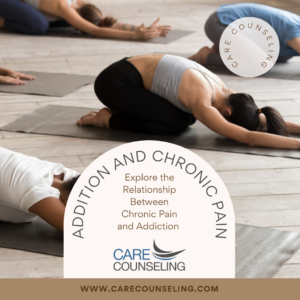Addiction and Chronic Pain
 Chronic pain and opioid addiction are two intricate and interrelated challenges that often coexist, creating a complex dilemma for individuals seeking relief and recovery. In this blog post, we’ll explore the intricate relationship between chronic pain and opioid addiction, along with the difficulties faced by individuals striving to manage pain within the context of addiction recovery.
Chronic pain and opioid addiction are two intricate and interrelated challenges that often coexist, creating a complex dilemma for individuals seeking relief and recovery. In this blog post, we’ll explore the intricate relationship between chronic pain and opioid addiction, along with the difficulties faced by individuals striving to manage pain within the context of addiction recovery.
The Link Between Chronic Pain and Opioid Addiction
- Pain as a Precursor: Many individuals with chronic pain are initially prescribed opioid pain medications as a legitimate treatment. However, over time, tolerance to these medications can develop, leading to increased doses and ultimately, dependence and addiction.
- Self-Medication: Some individuals turn to opioids as a way to self-medicate and alleviate their chronic pain symptoms, often without a prescription. This can be a dangerous path, as it increases the risk of addiction.
- Opioid-Induced Hyperalgesia: Prolonged use of opioids can paradoxically increase an individual’s sensitivity to pain, a phenomenon known as opioid-induced hyperalgesia. This can create a cycle where individuals use more opioids to manage increased pain, exacerbating their addiction.
- Psychological Distress: Chronic pain often leads to psychological distress, including anxiety and depression. Individuals may misuse opioids to cope with these emotional challenges, further fueling addiction.
Challenges of Managing Pain in Addiction Recovery
Managing chronic pain in the context of addiction recovery is particularly challenging due to several factors:
- Tolerance and Dependence: Individuals in recovery from opioid addiction often have built up a tolerance to opioids. This makes it difficult to manage pain with the same medications, as higher doses may be required.
- Risk of Relapse: Using opioids, even for legitimate pain management, can be a significant trigger for relapse among individuals in recovery from addiction.
- Limited Treatment Options: There is a limited range of pain management options available that do not carry the risk of addiction. This can make it challenging to effectively address chronic pain while in recovery.
- Stigma: Many individuals in addiction recovery face stigma and judgment from healthcare providers when discussing their chronic pain. This can lead to inadequate pain management and discouragement from seeking help.
- Complex Medication Interactions: Managing both chronic pain and addiction recovery often requires a careful balance of medications. Some pain management drugs may interact with medications used in addiction treatment, requiring close monitoring and coordination of care.
Strategies for Balancing Pain Management and Recovery
- Multidisciplinary Care: Collaborative care involving a team of healthcare providers, including addiction specialists, pain management specialists, and mental health professionals, can offer a more comprehensive approach to managing both conditions.
- Medication-Assisted Treatment (MAT): For individuals in recovery, MAT can be a viable option as it combines medications that reduce opioid cravings with counseling and therapy. MAT can help prevent relapse while addressing pain.
- Non-Opioid Pain Management: Exploring non-opioid pain management options such as physical therapy, acupuncture, chiropractic care, and cognitive-behavioral therapy can provide effective relief without the risk of addiction.
- Mindfulness and Meditation: Mindfulness techniques and meditation can help individuals manage pain and reduce reliance on opioids. These practices promote self-awareness and emotional regulation, which can be beneficial in both pain management and addiction recovery.
- Psychological Support: Engaging in counseling and therapy that focuses on pain management and addiction recovery can be immensely beneficial. These sessions can help individuals develop healthier coping strategies and address the emotional aspects of pain.
- Education and Advocacy: It’s crucial for individuals in recovery to educate themselves about their chronic pain condition and advocate for their pain management needs within the healthcare system. Self-advocacy can lead to more compassionate care.
The relationship between chronic pain and opioid addiction is a complex and challenging one. Many individuals find themselves caught in a cycle of pain, addiction, and psychological distress. However, with the right support and a multifaceted approach to treatment, it is possible to manage chronic pain while in recovery.
It’s essential to remember that recovery is a journey, and each person’s path is unique. Seeking professional guidance, building a supportive network, and exploring alternative pain management strategies can empower individuals to regain control of their lives and find relief from chronic pain without compromising their recovery from addiction. By addressing both conditions comprehensively, individuals can work toward a healthier, more fulfilling future.



























